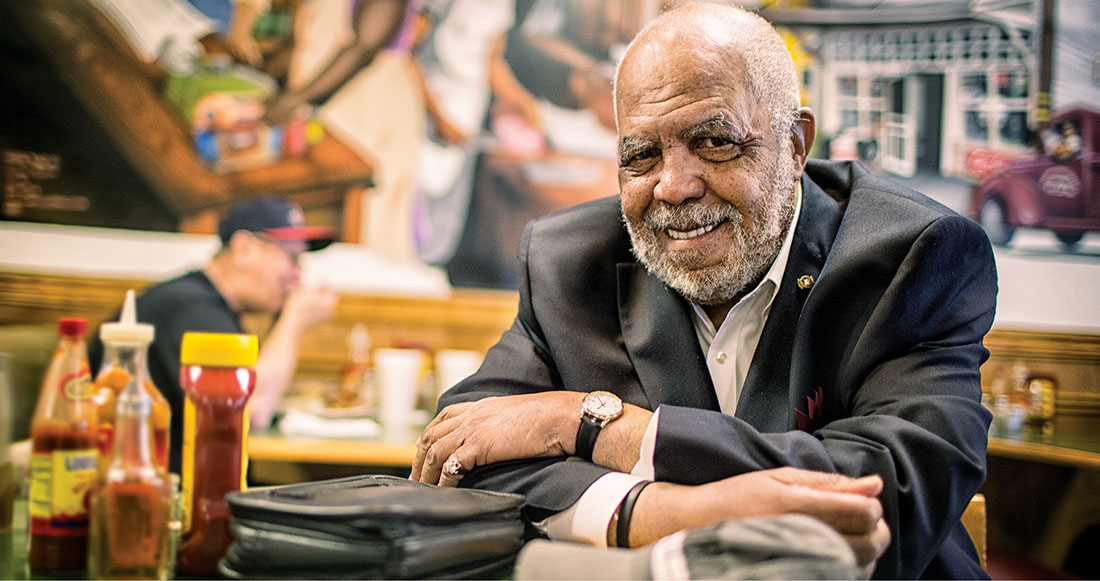For Community Leader Francis Guess, MBM’74, Kraft Award Recalls Early Lesson in Integrity

Francis Guess doesn’t shy from uncomfortable topics. The businessman, civil rights leader, philanthropist, public servant and community leader talks frankly about what it was like to be a Vietnam veteran assigned to work on the Army’s civil disturbance plans for his community, attending Vanderbilt in the 1970s when most students expected a black man to be on campus only if he wore a staff uniform, and how his education at Vanderbilt’s then-new management school was unconventional when compared to today’s B-schools.
That frankness and willingness to engage in dialogue is part of Guess’ effectiveness in business, public service and human rights. Appointed to the U.S. Commission on Civil Rights by President Ronald Reagan, he investigated and made recommendations regarding discrimination. Guess also led Tennessee’s Department of Labor and its Department of General Services, served more than three decades on the Tennessee Human Rights Commission, and was instrumental in helping corporations become diverse and sensitive to racial inequality.
Guess very nearly didn’t attend Vanderbilt.
“I had applied to the University of Tennessee law school and had been admitted,” he says. Then he read an article in Black Enterprise magazine about a management school starting at Vanderbilt. A college acquaintance working at Vanderbilt insisted Guess meet the admissions director. He did and soon enrolled.
“UT sent me a letter saying that they’d let me go to school there. Vanderbilt Graduate School of Management made me feel like they wanted me to go there,” Guess says.
In 1973, Guess joined one of the pioneering classes of what was to become the Owen School. The school was housed in Henry Clay Alexander Hall, a former mortuary on West End. Students either passed or failed courses—there were no grades. The management emphasis was on advising and problem-solving.
“Owen at that time was heavily oriented toward consultative-type work. As a result, we tended to lead with an attitude of ‘I am an analyst—where are my problems?’” he says.
Ever since, Guess has been a problem solver in business, government, community and non-profit arenas. The native Nashvillian runs his own helicopter company, Helicorp; worked as executive vice president of the Danner Co., a management and investment firm; and remains executive director of the Danner Foundation, which contributes primarily to Tennessee programs regarding education and health.
Guess serves or has served on boards for the Country Music Hall of Fame, NAACP, Nashville Convention and Visitors Bureau, Nashville Minority Business Development Loan Fund, and National Museum of African American Music. He was the first African American to head Nashville’s Rotary Club.
Recently, the Community Foundation of Middle Tennessee awarded Guess its annual Joe Kraft Humanitarian Award, adding him to a roster of honorees that includes John Seigenthaler, Martha Ingram, Vince Gill and Amy Grant, ’82. The foundation presents the award in memory of Nashville community leader Joe Kraft, BA’48, honored as “a remarkable person who led our community by strength of character and unwavering integrity.”
For Guess, receiving the award is a connection back to Kraft, who died in 1994.
“Joe was very close to my family when I was growing up—both Joe and his brother Cyril,” Guess says. “When I would go with my father, we walked in the back door everyplace else in Nashville—but when we went to his accountant, Kraft Brothers, we went in the front door. As a 12-year-old, that stuck with me.”
—NANCY WISE